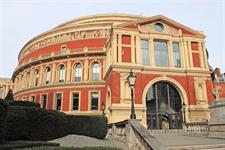The Royal Albert Hall has withdrawn a controversial proposal to add seats to some of its most lucrative boxes after opposition from peers.
The hall, which was established by royal charter and therefore needs parliament to approve changes to its constitution, wanted permission to add an extra two seats into each of its “grand tier” boxes as part of a Royal Albert Hall Bill that has been slowly progressing through the House of Lords in recent months.
The plan was last year widely criticised by peers because of concerns that the charity’s governance arrangements give rise to significant unmanaged conflicts of interest.
A letter published by parliament last week shows Victoria Prentis, the Attorney General, would not object to the bill if the clause relating to additional seats was removed.
The hall confirmed to Third Sector that the clause relating to the extra seats was being removed but it would push forward with the remainder of the legislation, which covers matters including the annual contribution paid to the charity by people who own seats at the historic venue.
But the letter from Prentis to Lord Gardiner, the senior deputy speaker of the House of Lords, said she was disappointed the bill was “not more ambitious”.
She said: “It is widely acknowledged that the constitution of the Corporation of the Hall of Arts and Sciences [the formal name of the hall] gives rise to a potential conflict between the private interests of seat-holding trustees and the corporation’s charitable objects.
“This potential conflict is of significant concern to the Charity Commission and many well-informed observers.
“Indeed, I wrote last year to the president of the corporation to express my disappointment that more had not been done to resolve the conflicts issue in the many years of its existence.
“I therefore regard the bill as a missed opportunity to effect meaningful change to the arrangements by which the Royal Albert Hall is governed.”
The Charity Commission asked the Attorney General in 2017 for permission to take a case about the hall’s governance arrangements to the charity tribunal. Jeremy Wright, the incumbent at the time, said yes before doing a U-turn a few weeks later, after the hall threatened to apply for a judicial review of the decision.
In 2021, Michael Ellis, the then-Attorney General, again refused a request by the regulator to take the case to the tribunal.
Prentis’ letter was among a bundle of papers published before a House of Lords committee conducted a hearing to decide whether two musicians’ organisations had sufficient standing to formally object to the bill.
The committee decided the group, which was represented by Richard Lyttelton, a former president of the Royal Albert Hall who has been campaigning for change to its governance arrangements, were not able to stand in opposition to the legislation.
But Lady Hale, a former Supreme Court president and chair of the committee, said the group intended to produce a special report to the House of Lords about “matters that it feels should be drawn to the attention of the house”.
She did not specify what these matters would be but Paul Bowen, the barrister representing the Royal Albert Hall, expressed concern that the report might risk perpetuating “misunderstandings and misconceptions” about how the hall’s ticketing system works.
Hale told Bowen that the committee would “take the greatest possible care in expressing ourselves on the matters to which we wish to draw the attention of the house” and warned him not to push his luck.
The hall’s construction was partly financed by selling 1,276 of its 5,272 seats to private investors in 1866.
Ownership of seats, inherited or traded over the years, provides membership of the Corporation of the Arts and Sciences and gives owners tickets for those seats to most events at the venue.
Seat-holders can do what they like with tickets for their seats, including using them, giving them to friends or charities, returning them to the box office to be sold at face value, or selling them on the open market.
The rise of ticket reselling websites has enabled seat-holders to sell tickets at prices far above face value.
Last year, tickets for an Ed Sheeran concert at the hall with a face value of £200 were being offered on the resale site Viagogo for £5,899, almost 30 times their original price.
This was despite Sheeran’s management team writing to seat-holders urging them to resell their tickets at face value so regular fans could afford to attend.
The 329 seat-holders elect 18 people from among themselves, plus a president, to a 24-strong council, which acts as its trustee board.
This means seat-holders elected to the council can, by setting guidelines and influencing the choice of events through the programming and marketing committee, make decisions that might affect the open market price of their tickets.
One of the grand tier boxes was being offered for sale last year with a guide price of £3m.
